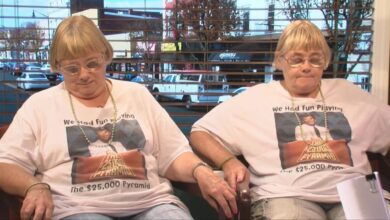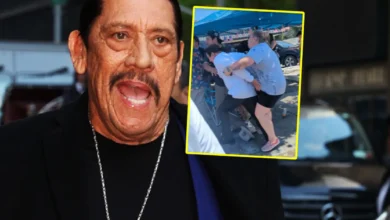Biz Markie, Pioneering Beatboxer And 'Just A Friend' Rapper, Dies At 57
Biz Markie, in an undated photo from the early years.
Michael Ochs Archives/Getty Images
Biz Markie, a larger-than-life hip-hop icon who was born Marcel Theo Hall in the United States, has died at the age of 57. Hall became a renowned cultural icon later in life, celebrated as much for his vibrant personality as for his enormous 1989 single, “Just A Friend.” Hall had a long and illustrious career that began in 1986. Jenni D. Izumi, his manager, verified his death.
“We appreciate the many calls and prayers of support that we have received at this trying time,” Izumi said in an email to NPR. “Biz built a legacy of talent that will be long celebrated by his business peers and his adoring fans whose lives he was able to touch through music over the course of his 35-year career.”
Izumi did not specify an official cause of death for Hall, who had apparently been ailing for months.
Biz grew up in a time when rap was still in its infancy, when it was a free-for-all in terms of approach and style, when it appeared innocent but was tremendously advanced. He was born in Harlem and moved to Long Island when he was a teenager.
Big Fun in the Big Town, a 1986 Dutch hip-hop documentary, provided an early exposure for those outside of New York, at least on film. A tall, lanky beatboxer wears a cap with large lettering spelling out “Biz Markie” on it. Onstage, he’s effusive with Roxanne Shanté, a fellow crew member. As the camera zooms in on Biz, they’re doing ecstatic back-and-forth routines, demonstrating his natural ability to pack a party and excite a crowd with his voice and genuine presence.
He was a founding member of the Juice Crew, a brilliant collective founded by producer Marley Marl, a visionary who gathered a squad so skilled and full of character that it could only be matched in the modern era by Wu-Tang Clan’s otherworldliness. Mr. Magic, a radio DJ, created the gang, which was largely made up of Queensbridge residents, and it was later signed to Tyrone Williams’ Cold Chillin’ Records label. “Roxanne’s Revenge,” their debut single, was produced by Bob Marley and featured a 15-year-old Roxanne Shante. The captivating single was a smash hit, and it was primarily responsible for Juice Crew’s early success.
Big Daddy Kane, Kool G Rap, Masta Ace, MC Shan, and others were among the members of the fledgling proto-supergroup. They were the vanguard of their generation, a formidable duo that bolstered the new school in the midst of rap’s skyrocketing popularity in the mid-’80s. Each of the members had their own characteristics. Biz was the jester in a band of serious rhyming specialists, if Kane was the dancing playboy and G Rap was the hustler. His delivery was never as deft as the others’, but he took use of his size with props and costumes, beatboxed with the mic pressed against his neck, and made himself the punchline. His self-deprecation was a delightful contrast in a world of braggadocio, and it was a subject he never drifted too far from for the rest of his career. Many people refer to him as hip-“clown hop’s prince.”
Goin’ Off, Biz’s first official solo album, was released in 1988 and was produced by Marley Marl. It featured singles such as “Make the Music with Your Mouth, Biz,” “Nobody Beats the Biz,” and “Vapors,” a comical four-verse tale of prosperity and envy that was a hit. He laments endearingly in the song’s closing stanza: “‘Can I be down, champ?’ I ask. ‘No!’ they said, treating me as if I were a wet food stamp.”
Markie’s sophomore album, The Biz Never Sleeps, produced “Just A Friend,” which became not only Markie’s most well-known song, but also one of rap’s most lasting. It was his biggest single, ranking at No. 9 on Billboard, and featured a great sample of Freddie Scott’s “You Got What I Need.” In the song video, Biz wears a powdered wig and plays the piano like Mozart. It was a story-rap about continual rejection, with an earworm chorus to back it up. On the cover of the 12-inch single, Biz is shown crying with a large scowl and a handkerchief.
From left: Comedian and actor Tracy Morgan, Biz Markie and actor Samuel L. Jackson, photographed on July 14, 2004 in Los Angeles. Carlo Allegri/Getty Images hide caption toggle caption Carlo Allegri/Getty Images
The sequel to Biz Never Sleeps, I Need A Haircut, is well known for a court judgment on copyright law: Gilbert O’Sullivan, a singer-songwriter, sued Biz and his record label, Warner Bros., for using his 1972 hit “Alone Again (Naturally)” without permission. As a result of this landmark ruling, sampling restrictions were tightened in the future, requiring all future rap (and other music) releases to adhere to strict licensing rules. Despite some bright moments, such as “Alone Again,” the song that got them in trouble and shocked the entire industry, copies of I Need A Haircut were taken from shop shelves, making it a failure. All Samples Cleared! was the title of his next album.
As the 1990s drew to a close, it was evident that Biz had been entrenched not only in hip-hop but also in other genres. The Beastie Boys, for example, featured him on three of their albums: Check Your Head (1992), Ill Communication (1994), and Hello Nasty (1995). (1998). The Rolling Stones sampled him on “Anybody Seen My Baby,” and his voice were inserted to the song’s middle section. He also made appearances on reality television (Celebrity Fit Club) and mainstream radio in songs such as Len’s “Beautiful Day” from 1999.
Weekend Warrior, Biz’s final studio album, was released in 2003 and included him working with producers 45 King and J-Zone, however he was responsible for the majority of the beats. P. Diddy’s ennobled status was confirmed with a significant presence. On the album, he eulogizes Aaliyah and Lisa “Left Eye” Lopez in the intro before listing all of his favorite Chinese foods in the chorus.
He also appeared in the movies, in Men In Black II, as an intercosmic version of himself. On television, he had a recurrent part on Yo Gabba Gabba!, a music-themed children’s show. He offers short instructionals on how to beatbox, frequently in costume, in a fun section called “Biz’s Beat of the Day.” On Chris Rock’s No Apologies tour, he also served as an opener. T-shirts depicting his visage and the now-famous reactionary remark, “Oh Snap!” were extensively distributed. Dolls in his likeness, cereal boxes, and action figures all became collectible goods when his fandom was at an all-time high.
Biz might be found on social media, sharing toys from his collection or playing 45s while clothed in a onesie, until rumors of his recent illness in late July of 2020. He continued to tour and make guest appearances on a regular basis. He’d stick show fliers up, either old ones that felt historic or new ones from tech conventions. There are also photos of him with other icons such as Slick Rick and Rakim. His giant grin and hilarious energy were intact, just as they were in that 1986 Dutch documentary.
“‘Cause when the beats sound iffy and the kids bark live / It’ll be a sad day like when the Bizmark dies,” an independent rapper named Edan predicted in 2005 on the track “Funky Voltron,” saying: “‘Cause when the beats sound iffy and the kids bark live / It’ll be a sad day like when the Bizmark dies.” Biz has easily projected joie de vivre for over 30 years through wholesome and good-spirited humor. His work felt inclusive; he wanted us to laugh and be pleased by his toys, record collection, beats, melodies, jokes, and the expressions he’d produce. That’s exactly what we were.




